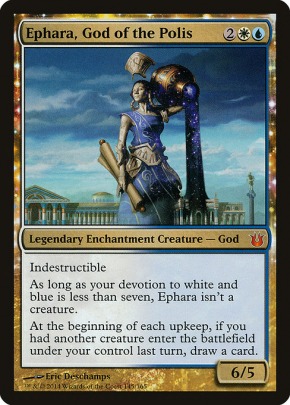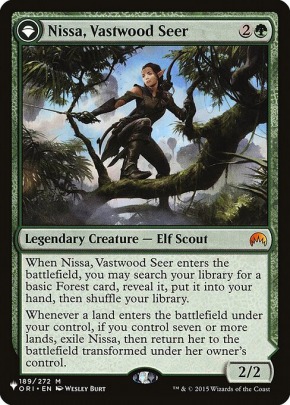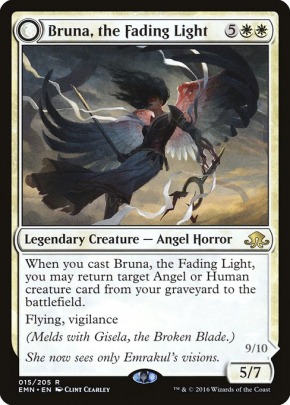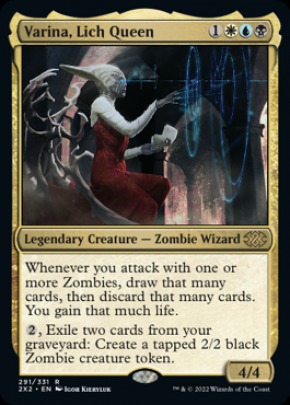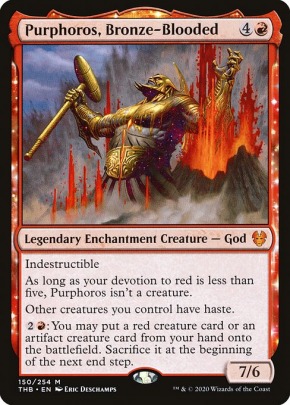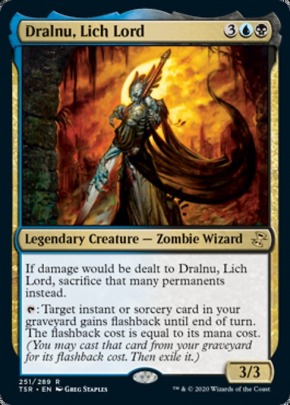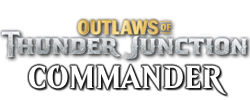Teaching threat assessment
So title pretty much says it all. What is the best way to teach threat assessment to newer players? My local meta is fairly powerful but we have newer players who have little to no concept of proper threat assessment and I'm trying to figure out a way to ease them into rather than just run them over until they get it or quit playing all together. I've tried just talking with the main new guy we play with but he still just attacks whoever is sitting across the table from him or attacks whoever cant block him and his removal target assessment is also almost non existent.
I don't see how you can properly assess threats in commander until you've played a lot. Card and meta knowledge are so intrinsic to the skill.
There are usually teachable moments like "when you spent removal on X, it let Y happen." But you've got to be kinda delicate about this since it can come off as self-serving.
There are usually teachable moments like "when you spent removal on X, it let Y happen." But you've got to be kinda delicate about this since it can come off as self-serving.
Threat assessment is a difficult skill to master in EDH - in addition to all of the board complexity, there is also a lot of hidden information in the form of cards in hand... but also in terms of overall deck strategies. In other formats, you can become familiar with a particular deck and its gameplan, which allows you to craft a heuristic to know how close they are to winning. However, in EDH, every deck is going to be different - it won't be possible to know what a particular deck is doing until you've played against it a few times. There are some times when an opponent may play an innocuous card that is part of an obscure combo... but it's also possible for a low-powered deck to drop something terrifying and look scarier than they actually are (ex: using Omniscience to cast Craw Wurm).
Anyway, my recommendation for teaching would probably be to do so by example - let the new player know what your own threat assessment is and why. Point out things that may not be obviously threatening, such as if someone has recently tutored or drawn a bunch of cards. Try to be transparent when you play something that they should be concerned about.
Talking outside the game may also be an appropriate line to take - ask the person in question if they would like advice / assistance with threat assessment. They'll probably be more likely to take pointers if you make it clear that it is well-intentioned instead of biased diplomancy.
Anyway, my recommendation for teaching would probably be to do so by example - let the new player know what your own threat assessment is and why. Point out things that may not be obviously threatening, such as if someone has recently tutored or drawn a bunch of cards. Try to be transparent when you play something that they should be concerned about.
Talking outside the game may also be an appropriate line to take - ask the person in question if they would like advice / assistance with threat assessment. They'll probably be more likely to take pointers if you make it clear that it is well-intentioned instead of biased diplomancy.
When I was teaching new players in Savannah, I told them at that at each player's end step they should be able to answer these questions for themselves (it will take a lot of games to get good at assessing this data):
Which player(s) is/are "in the lead" (which may be indicated by board position, combo pieces available/in-play, etc.)?
Which player(s) is/are the biggest threat to my deck's strategy/tactics?
If I have/draw removal; which permanent, for each type, should I target first?
- Removal Targets should be prioritized based on a self determined list. . . e.g. - (an example list):
-- Permanents that combo/directly lead to opponent victory
-- Permanents that directly oppose my strategy/tactical position
-- Permanents that directly lead to incremental advantage
For counters and other spell-based interference, a similar list should be applied for each opportunity to counter/interfere . . . e.g. - (an example list):
-- Permanents that combo/directly lead to opponent victory / Always counter if the counter is available
-- Permanents that directly oppose my strategy/tactical position / Usually counter, if other removal is not available
-- Permanents that directly lead to incremental advantage / May counter if available based on the situation
As far as combat steps are concerned, I am generally rather conservative there unless playing a sligh-style aggro deck where both combat and speed matter. So I usually council new players that unless there is a reason to attack - don't. It's rarely a good idea to attack with everything, and early game it's often better to have a blocker available, than sneak in that 1-2 damage on an unnecessary attack. When it is time to attack, attack based on specific reason (e.g. kill the PW), amount of risk, and/or amount of reward. If your reason for attacking doesn't fit one of these three categories, you are probably better off not attacking.
Again, all of this is general advice until they get better and more comfortable with the format and develop their own preferred play styles. And, for any given deck/game, there will be so many variables that much of this may not apply.
Which player(s) is/are "in the lead" (which may be indicated by board position, combo pieces available/in-play, etc.)?
Which player(s) is/are the biggest threat to my deck's strategy/tactics?
If I have/draw removal; which permanent, for each type, should I target first?
- Removal Targets should be prioritized based on a self determined list. . . e.g. - (an example list):
-- Permanents that combo/directly lead to opponent victory
-- Permanents that directly oppose my strategy/tactical position
-- Permanents that directly lead to incremental advantage
For counters and other spell-based interference, a similar list should be applied for each opportunity to counter/interfere . . . e.g. - (an example list):
-- Permanents that combo/directly lead to opponent victory / Always counter if the counter is available
-- Permanents that directly oppose my strategy/tactical position / Usually counter, if other removal is not available
-- Permanents that directly lead to incremental advantage / May counter if available based on the situation
As far as combat steps are concerned, I am generally rather conservative there unless playing a sligh-style aggro deck where both combat and speed matter. So I usually council new players that unless there is a reason to attack - don't. It's rarely a good idea to attack with everything, and early game it's often better to have a blocker available, than sneak in that 1-2 damage on an unnecessary attack. When it is time to attack, attack based on specific reason (e.g. kill the PW), amount of risk, and/or amount of reward. If your reason for attacking doesn't fit one of these three categories, you are probably better off not attacking.
Again, all of this is general advice until they get better and more comfortable with the format and develop their own preferred play styles. And, for any given deck/game, there will be so many variables that much of this may not apply.
V/R
Treamayne
Treamayne
- toctheyounger
- Posts: 3991
- Joined: 4 years ago
- Pronoun: he / him
- Location: Auckland, New Zealand
Honestly, I learned by losing lots of games as a control deck. Nothing teaches you how to optimize like quickly realizing how little a deck that is chock to the brim with answers can actually achieve trying to answer everything 3 other players do. Its sink or swim really, and different threats need different answers, some are total, some are semi permanent and some are temporary. It varies and thats just learned with experience.
Id straight up recommend that though. Control isn't easy but improving at it just really opens up the rabbit hole ot threat assessment and game theory in magic. Very worth it.
Id straight up recommend that though. Control isn't easy but improving at it just really opens up the rabbit hole ot threat assessment and game theory in magic. Very worth it.
-
ISBPathfinder Bebopin
- Posts: 2161
- Joined: 4 years ago
- Pronoun: he / him
- Location: SD, USA
I had a young guy I knew who started a few years ago and he still has a hard time with it. I often tell him to reflect on how the game ended and then think about where he spent his interaction and how he pressured players after games. When someone uses spot removal to stop some value play and then two turns later someone combos off I think its important to ask if the spot removal was well spent or not.
Its something that I think is best done with self reflection after games. I don't think there is a magic answer on how to do it better but threat assessing at the start of the game and then again continuously as the game progresses is a big deal. Knowing player's playstyles as well as common wincons of commanders is useful as well but that also comes with experience.
Its something that I think is best done with self reflection after games. I don't think there is a magic answer on how to do it better but threat assessing at the start of the game and then again continuously as the game progresses is a big deal. Knowing player's playstyles as well as common wincons of commanders is useful as well but that also comes with experience.
[EDH] Vadrok List (Suicide Chads) | Evelyn List (Vamp Mill) | Sanwell List | Danitha List | Indominus List | Ratadrabik List
- toctheyounger
- Posts: 3991
- Joined: 4 years ago
- Pronoun: he / him
- Location: Auckland, New Zealand
I try to do this too. Sometimes you get a feeling you got close to a W, and it can be worth having a mental debrief and running through theoretical sequences and such to see where you mightve managed to tighten things up and come out on top. As a bonus this is often a really good way to explore the nooks and crannies of a build to find new uses for your inclusions.ISBPathfinder wrote: ↑2 years agoI had a young guy I knew who started a few years ago and he still has a hard time with it. I often tell him to reflect on how the game ended and then think about where he spent his interaction and how he pressured players after games. When someone uses spot removal to stop some value play and then two turns later someone combos off I think its important to ask if the spot removal was well spent or not.
Its something that I think is best done with self reflection after games. I don't think there is a magic answer on how to do it better but threat assessing at the start of the game and then again continuously as the game progresses is a big deal. Knowing player's playstyles as well as common wincons of commanders is useful as well but that also comes with experience.
I think the other side of this, ruminating on what other people mightve played, it can be a bit of a crapshoot but it is still good to know what sort of angles people are likely to be taking, and thats just learning knowing common cards, synergies and combos. That just comes with time and observation. Learning where to stick your spanner in the works is important too.
- hyalopterouslemur
- Posts: 3218
- Joined: 4 years ago
- Pronoun: he / him
Pretty much this. Threat assessment is much more instinctive, since you don't have perfect knowledge. But sometimes players can give it away.
And don't be dumb about it. If you see an Eldrazi or a Blightsteel Colossus, just let that Final Judgment through.
Thanks to Feyd_Ruin for the avatar!
Not really related to this topic but this made me think of something that I have experienced playing Catan and wondered how you think it pertains to Magic Threat assessment in commander.
Commander and Catan are both multiplayer games that encourage 'catch up' by allowing people to gang up on the person who is winning.
Scenario in Catan:
Player A is at 8 points, I am at 5 points and player B is at 7 points. Player B has one resource in hand and I know what it is. I roll a 7, and use it to steal from player B. Player B freaks out because I should be targeting player A. I argue that my goal isn't to stop player A from winning if that means player B will win instead. My goal is to put myself into the best position possible to win. Getting that specific resource can help me get to 10.
I was not popular for this kind of play but it won me games.
I think this kind of scenario happens a lot in commander. People will think I have poor threat assessment but my point of view is that I shouldn't use my interaction to just stop the person who is in the lead. For example:
Player A has a big board of creatures, casts Pathbreaker Ibex and passes the turn, presenting lethal against all players on their next turn.
Player B casts Avacyn, Angel of Hope and passes the turn.
I am player C, and I have nothing in play and a low lifetotal. I know player D has some wraths in their deck and that my only chance of coming out of this game is if player D casts a wrath. So, on my turn I cast Oblivion Ring targeting Avacyn.
If Player D has no wrath, we all lose. If they have a wrath, then player B won't have an Avacyn in play.
If I had spent my Oring targeting Pathbreaker Ibex, I would have lost the game whether or not player D had a wrath. Not sure who would have won the game, but I would for sure have lost.
If player D has no wrath, I look like a kingmaker... but my goal should be to find the line to victory. Not just to stop the person who is leading.
Anyway, curious what others think of this. I think the term Threat Assessment is mis-named because it is more than assessing threats, it is about identifying your best line to victory and playing to your outs.
Commander and Catan are both multiplayer games that encourage 'catch up' by allowing people to gang up on the person who is winning.
Scenario in Catan:
Player A is at 8 points, I am at 5 points and player B is at 7 points. Player B has one resource in hand and I know what it is. I roll a 7, and use it to steal from player B. Player B freaks out because I should be targeting player A. I argue that my goal isn't to stop player A from winning if that means player B will win instead. My goal is to put myself into the best position possible to win. Getting that specific resource can help me get to 10.
I was not popular for this kind of play but it won me games.
I think this kind of scenario happens a lot in commander. People will think I have poor threat assessment but my point of view is that I shouldn't use my interaction to just stop the person who is in the lead. For example:
Player A has a big board of creatures, casts Pathbreaker Ibex and passes the turn, presenting lethal against all players on their next turn.
Player B casts Avacyn, Angel of Hope and passes the turn.
I am player C, and I have nothing in play and a low lifetotal. I know player D has some wraths in their deck and that my only chance of coming out of this game is if player D casts a wrath. So, on my turn I cast Oblivion Ring targeting Avacyn.
If Player D has no wrath, we all lose. If they have a wrath, then player B won't have an Avacyn in play.
If I had spent my Oring targeting Pathbreaker Ibex, I would have lost the game whether or not player D had a wrath. Not sure who would have won the game, but I would for sure have lost.
If player D has no wrath, I look like a kingmaker... but my goal should be to find the line to victory. Not just to stop the person who is leading.
Anyway, curious what others think of this. I think the term Threat Assessment is mis-named because it is more than assessing threats, it is about identifying your best line to victory and playing to your outs.
The New World fell not to a sword but to a meme
Hmmm.... I would disagree with this assertion. To me, threat assessment, as a skill, is purely about evaluating the game state and determining, well, threat levels. Knowing whether an opponent is in a strong or weak position is a valuable skill, as is the ability to evaluate your own position. If you have good threat assessment, you can do things like manipulate your own threat level to make opponents ignore you... or you can leave scary but not actually threatening cards on the board to pump up an opponent's threat level. However, I would say that identifying a path to victory is a distinct skill: strategy. They're certainly related - if you understand your opponents' strategy, it is easier to assess whether or not they are currently a threat / close to winning. However, I do view them to be distinct skills.
I'll note that diplomacy is also a distinct skill. I actually think that leaning on that skill probably would have been a more consistent line in this situation - prior to casting Oblivion Ring, player C could have checked with D whether or not they had a board wipe to cast. If not, they could have negotiated with A to target Avacyn instead of Pathbreaker Ibex in exchange for not being attacked.... or they could have done the same negotiation with B to get rid of the Pathbreaker. This obviously depends on your opponents being willing to negotiate... but given that your alternative is the (relatively small) chance that D will have a board wipe to cast, I think that's a reasonable bet to take.
Still, this is getting into pedantics, so meh.
- toctheyounger
- Posts: 3991
- Joined: 4 years ago
- Pronoun: he / him
- Location: Auckland, New Zealand
Yeah those are valid points. Theres a TON of gaming content where someone says 'guys we gotta deal with X' and everyone just agrees and nukes someone into the ground. I don't get it. Curry favors, let your pals put more in than you do, seem like a team player and keep an ace up your sleeve. Thats just sensible and pragmatic- and also a lesson learnt. The amount of times I've been crapped on clearing the way for someone else's victory lap, all because I ran myself out of answers is a lesson in itself. There is no reason not to hold something back to get you there.
The catan analogy is a good one to me and I don't care if it makes me a dick to roll like that, its just sensible. Someone has to win, and it makes sense I'd prefer it were me. Frankly for the longest time I consider this sort of thing implicit, whereby me saying 'sure ill help out' means 'sure ill help out as far as its in my best interests to do so'. I think that and I presume most other people do too.
I'm all for some diplomacy, just don't let your chances of victory rely on it if you can at all help it.
The catan analogy is a good one to me and I don't care if it makes me a dick to roll like that, its just sensible. Someone has to win, and it makes sense I'd prefer it were me. Frankly for the longest time I consider this sort of thing implicit, whereby me saying 'sure ill help out' means 'sure ill help out as far as its in my best interests to do so'. I think that and I presume most other people do too.
I'm all for some diplomacy, just don't let your chances of victory rely on it if you can at all help it.
-
VertiererKabbalisten-Schatzmeister
- Posts: 138
- Joined: 4 years ago
- Pronoun: Unlisted
- Location: Ringe des Saturns
For learning good threat assessment I would thorougly watch Tyler from PlayToWin. I don't like all the advertising and the other typical "content creator" crap done on the channel recently, but Tyler is, in my opinion, a really good player when it comes to reading and playing the table.
The mills of god grind slowly
-
TheAmericanSpirit Supreme Dumb Guy
- Posts: 2205
- Joined: 4 years ago
- Pronoun: he / him
- Location: IGMCULSL Papal Palace
I'm going to agree largely with the above and say that proper threat assessment is definitely an experiential skill rather than one that can really be taught. In theory, you can hammer out dos and don'ts into a page of bullet points, but the exceptions and nuance will be lost. Instead, I would simply keep playing and giving advice when solicited and if they're sufficiently invested in playing EDH, they'll figure out a system that works for them and a means by which to analayze winning lines in games. I also believe that they will end up better at the skill if they struggle through the newbies losing blues for its natural course instead of trying to foreshorten it with knowledge without context.
It's almost like math; the new player must know why it works, not simply that it does.
It's almost like math; the new player must know why it works, not simply that it does.
There's no biscuits and gravy in New Zealand.
(Except when DirkGently makes them!)
(Except when DirkGently makes them!)
@Mookie
I guess I was thinking that people misuse threat assessment and imply it should dictate your strategy. I also saw the chance for diplomacy in my scenario but decided not to go there. Happy you did.
I think maybe we are dealing with a trifecta - threat assessment, strategy and diplomacy. These are the three skills that you can utilize to achieve victory.
So while this thread is about threat assessment I just want to say that I think it is important to be careful when telling someone the had poor threat assessment and gave the game to the winner. If it is a new player, yes, you can help them think about threat assessment more... but with experienced players I would not go there.
I guess I was thinking that people misuse threat assessment and imply it should dictate your strategy. I also saw the chance for diplomacy in my scenario but decided not to go there. Happy you did.
I think maybe we are dealing with a trifecta - threat assessment, strategy and diplomacy. These are the three skills that you can utilize to achieve victory.
So while this thread is about threat assessment I just want to say that I think it is important to be careful when telling someone the had poor threat assessment and gave the game to the winner. If it is a new player, yes, you can help them think about threat assessment more... but with experienced players I would not go there.
The New World fell not to a sword but to a meme
Everyone can be taught. Not everyone will learn. Some players will never evaluate threat assessment optimally for one reason or another. They tend to play the short game at the expense of the long game. There's also players that prioritize plays that are emotionally satisfying to them over plays that will preserve or advance their position, even if they already know better or if you explain the situation to them. They will occasionally stumble upon the optimal play, not to be confused with learning. There's also players who derive gratification by deliberately making suboptimal decisions, sometimes just to be contrary, perhaps even out of spite, or maybe they're afraid if they win games they'll lose friends.
“Comboing in Commander is like dunking on a seven foot hoop.” – Dana Roach
“Making a deck that other people want to play against – that’s Commander.” – Gavin Duggan
"I want my brain to win games, not my cards." – Sheldon Menery
“Making a deck that other people want to play against – that’s Commander.” – Gavin Duggan
"I want my brain to win games, not my cards." – Sheldon Menery

